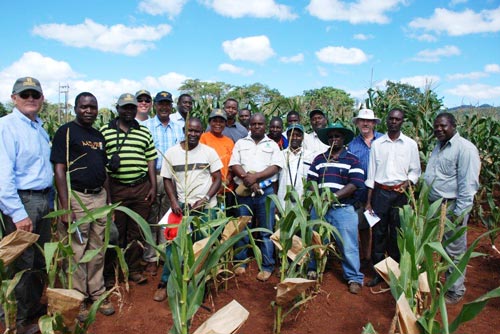 Covering 2,400 km, a multinational team toured Drought Tolerant Maize in Africa (DTMA) trial and demonstration plots in Malawi, Mozambique, Zambia, and Zimbabwe from 21–30 April in a traveling workshop that combined peer learning and project monitoring and evaluation. The team of 17 was made up of breeders from the national programs, DTMA scientists, and DTMA Advisory Board Chair Dave Westphal. Participants had the opportunity to compare notes, gain new knowledge based on the experiences of colleagues in other countries, and gauge themselves against their peers based on practical, real-life results. “Having a diverse group like this is very educational,” said DTMA Seed Systems Objective Leader John MacRobert.
Covering 2,400 km, a multinational team toured Drought Tolerant Maize in Africa (DTMA) trial and demonstration plots in Malawi, Mozambique, Zambia, and Zimbabwe from 21–30 April in a traveling workshop that combined peer learning and project monitoring and evaluation. The team of 17 was made up of breeders from the national programs, DTMA scientists, and DTMA Advisory Board Chair Dave Westphal. Participants had the opportunity to compare notes, gain new knowledge based on the experiences of colleagues in other countries, and gauge themselves against their peers based on practical, real-life results. “Having a diverse group like this is very educational,” said DTMA Seed Systems Objective Leader John MacRobert.
DTMA addresses a real need in the region: “Drought is part and parcel of our farming systems,” said Zamseed veteran breeder Verma Bhoola when he hosted the team at the company’s farm. “Over 90% of maize grown in Zambia is rainfed, so prone to drought,” he said, emphasizing the importance of breeding for drought tolerance not only in Zambia but also in the rest of Africa, where most maize farming depends on rain patterns that are increasingly unpredictable as a result of climate change. “Twenty-five percent of maize production in Africa is threatened by frequent drought, while 40% is affected by occasional drought,” said DTMA project leader Tsedeke Abate during a feedback session at the end of the workshop.
The project is making significant strides. “We are on track in terms of overall production of drought-tolerant maize seed,” said Abate. More than 100 varieties have been released in 13 countries. “Zimbabwe is leading in seed production, with over 7,000 metric tons of drought-tolerant seeds produced by the end of 2012,” he said.
The tour ended with awards for the top-performing teams in breeding and dissemination. Malawi won top honors in both categories, for the trial plots at the research station and a well-managed demonstration plot in Mkanda Village, on the outskirts of Lilongwe, run by the Vibrant Mkanda Women’s Group. “This really demonstrates what DTMA is doing in partnership with the seed companies and national programs,” said Westphal. DTMA aims to produce and market 70,000 tons of seed annually by 2016.
 Climate adaptation and mitigation
Climate adaptation and mitigation